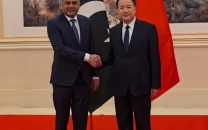Pakistan faces another setback in Reko Diq case
British Virgin Islands court passes an order to attach some of country’s assets in its territories

Pakistan is faced with another setback on the international legal front as the British Virgin Islands high court has passed an order to attach some of its assets due to Pakistan’s failure to provide bank guarantee to an international arbitrator in the Reko Diq case.
Sources revealed to The Express Tribune that the high court of the British Virgin Islands passed an ex parte order on December 16 regarding the attachment of Pakistani assets.
In view of that order, Pakistan cannot sell the assets managed by offshore companies registered in this small overseas territory of the United Kingdom.
The Tethyan Copper Company (TCC) had sought attachment of these assets for enforcement of the $6 billion award that the International Center for Settlement of Investment Disputes (ICSID) slapped on Pakistan on July 12, 2019 for revoking the TTC contract for mining at Reko Diq in Balochistan.
The ICSID later stayed the enforcement of the $6b award and on September 17 issued a 70-page order which said the stay shall continue on a conditional basis.
The arbitrator ordered Pakistan to provide an “unconditional and irrevocable” bank guarantee or the letter of credit (LC) for 25 per cent of the award, plus accrued interest as of the date of the decision.
The guarantee or the LC was to come from a reputable international bank based outside of Pakistan, which was pledged in favour of the claimant —the TCC — and to be released on the order of the ICSID.
The ICSID also held that if Pakistan could not furnish the security and undertaking in terms as set out within 30 days after notification of the decision, the stay of enforcement in the amount of 50 per cent of the award, plus accrued interest as of the date of the decision would be lifted.
However, Pakistan missed the deadline and did not deposit 25 per cent bank guarantee.
After the British Virgin Islands high court’s order, the office of the Attorney General for Pakistan (AGP) said the Pakistan government is vigorously contesting the matter with all legal resources available to it and is also engaged in settling the matter actively.
“Without prejudice to such engagement, it is reiterated that the government of Pakistan shall vigorously pursue proceedings initiated by the TCC in any jurisdiction and the government reaffirms its commitment to protecting national assets, wherever they may be located,” said AGP statement.
Source said Pakistani authorities are hopeful that the country will reach an out of court settlement with the TCC next year. Senior lawyers are of the opinion that the claimant company has no choice but to reach out for an out of court settlement as Pakistan has very limited assets abroad.
The TCC had initially claimed $11.43 billion in damages for the termination of their contract but Pakistan’s incumbent legal team was able to limit the sum to $4.08 billion. In 2012, the TCC filed a claim for international arbitration before the ICSID of the World Bank. The litigation carried on for seven years.
Former chief justice of Pakistan Iftikhar Chaudhary’s judgment in the Reko Diq case was the first in the previous government’s tenure. The current PTI led government has already spent $10 million as legal expenditures on this case.
Many senior lawyers have been critical of the former CJ’s judgments which in the ensuing years have caused trouble for policymakers and stirred concerns amid international investors.
A senior official revealed that the “misstatement” of scientist Dr Samar Mubarakmand before the tribunal was one of the main reasons behind the ICSID slapping the heavy penalty on Pakistan.
Dr Samar had claimed that the Reko Diq gold mines would fetch the country around $2.5 billion annually. He had also maintained that Reko Diq and other gold reserves in the country will bring in $131 billion to the national exchequer. The tribunal relied on his statement.
Senior lawyers had expressed serious concern over the National Accountability Bureau’s (NAB) decision to file a reference against Pakistani officials in the Reko Diq case a couple of months ago. They said NAB should be restrained from doing anything harmful to national interest.
The ICSID had already rejected Pakistan’s allegation that former Balochistan chief minister Nawab Aslam Raisani was offered a bribe of US$1 million by the TCC in connection with Reko Diq mines in 2009.
“The tribunal concludes that the respondent [Pakistan] has not established any of its individual allegations of corruption that would be attributable to the claimant [TCC].
"The tribunal has found no proven incident of the claimant (TCC) exercising, or attempting to exercise, improper influence on government officials aimed at obtaining rights or benefits relating to the claimant’s investment in Pakistan,” said the ICSID’s 425-page judgment issued July 2019.
In November 2017, the ICSID rejected Pakistan’s more than one dozen allegations.
The tribunal had noted that the local expert group recommended in its briefing note of June 4, 2015, that the Balochistan government should write to NAB to initiate an inquiry into corruption and corrupt practices in respect of Reko Diq.
In line with this recommendation, the Balochistan government requested NAB to initiate an inquiry through a letter dated June 22, 2015, which NAB did by authorization of its chairman two days later.
“Taking into account that NAB started to interview the seven individuals identified by the local group of experts as well as further individuals in July 2015 and obtained in the course of August and September 2015 so-called Section 161 statements from the individuals that Pakistan presented as witnesses in this arbitration in which each of them confessed to having been directly involved in corruption.
“It is indeed remarkable that as far as the tribunal has been informed, NAB has to date not initiated a prosecution against any of these individuals. The tribunal also feels the need to record its concern as regards the timing and context in which the evidence was produced,” said the verdict.
It noted that NAB did not allow for an inspection of the diary outside Pakistan and then refused Pakistan’s own expert LaPorte to perform the very analysis for which he had been retained, ie, an ink-dating analysis, which could have positively proven that two of the relevant entries in the diary were made in 2015 rather than in 2008 and thus that the evidence would have been fabricated.
However, NAB on November 5 announced to file a reference against 26 people over abuse of authority in the Reko Diq project. It said the reference was the result of a thorough investigation into the 30-year record by the director general of NAB Operations and the director general of NAB Balochistan.
NAB also issued the names of 26 accused, nominated in the reference filed in an accountability court of Quetta. It included names of a former caretaker governor, former chief secretary, former senior officials of mines and minerals department, Balochistan Development Authority and Revenue Department and representatives of Australian mining companies.
Legal experts said in the absence of solid evidence, NAB should not proceed into the matter.




1734118407-0/New-Project-(1)1734118407-0-208x130.webp)














COMMENTS
Comments are moderated and generally will be posted if they are on-topic and not abusive.
For more information, please see our Comments FAQ